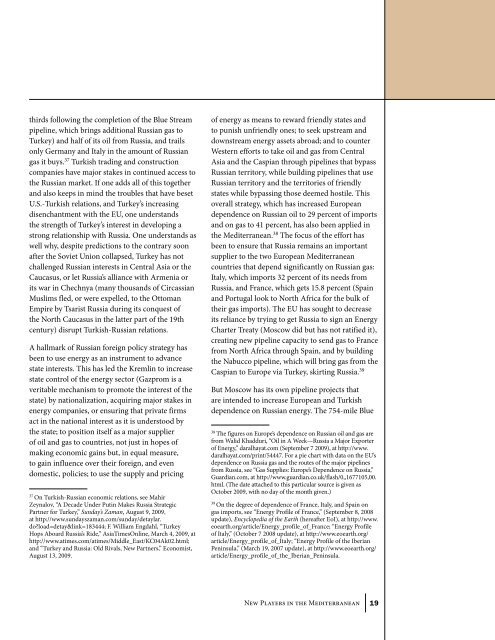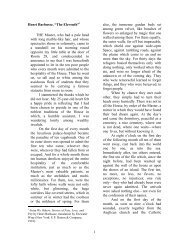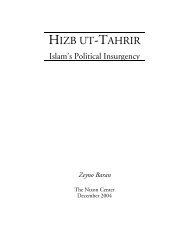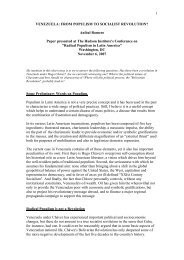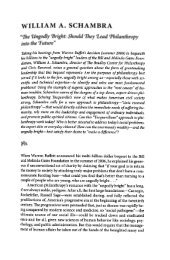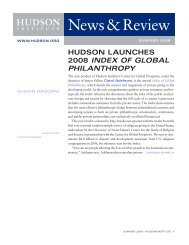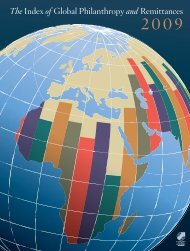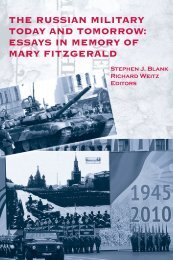NEW PLAYERS IN THE MEDITERRANEAN - German Marshall ...
NEW PLAYERS IN THE MEDITERRANEAN - German Marshall ...
NEW PLAYERS IN THE MEDITERRANEAN - German Marshall ...
You also want an ePaper? Increase the reach of your titles
YUMPU automatically turns print PDFs into web optimized ePapers that Google loves.
thirds following the completion of the Blue Stream<br />
pipeline, which brings additional Russian gas to<br />
Turkey) and half of its oil from Russia, and trails<br />
only <strong>German</strong>y and Italy in the amount of Russian<br />
gas it buys. 37 Turkish trading and construction<br />
companies have major stakes in continued access to<br />
the Russian market. If one adds all of this together<br />
and also keeps in mind the troubles that have beset<br />
U.S.-Turkish relations, and Turkey’s increasing<br />
disenchantment with the EU, one understands<br />
the strength of Turkey’s interest in developing a<br />
strong relationship with Russia. One understands as<br />
well why, despite predictions to the contrary soon<br />
after the Soviet Union collapsed, Turkey has not<br />
challenged Russian interests in Central Asia or the<br />
Caucasus, or let Russia’s alliance with Armenia or<br />
its war in Chechnya (many thousands of Circassian<br />
Muslims fled, or were expelled, to the Ottoman<br />
Empire by Tsarist Russia during its conquest of<br />
the North Caucasus in the latter part of the 19th<br />
century) disrupt Turkish-Russian relations.<br />
A hallmark of Russian foreign policy strategy has<br />
been to use energy as an instrument to advance<br />
state interests. This has led the Kremlin to increase<br />
state control of the energy sector (Gazprom is a<br />
veritable mechanism to promote the interest of the<br />
state) by nationalization, acquiring major stakes in<br />
energy companies, or ensuring that private firms<br />
act in the national interest as it is understood by<br />
the state; to position itself as a major supplier<br />
of oil and gas to countries, not just in hopes of<br />
making economic gains but, in equal measure,<br />
to gain influence over their foreign, and even<br />
domestic, policies; to use the supply and pricing<br />
37<br />
On Turkish-Russian economic relations, see Mahir<br />
Zeynalov, “A Decade Under Putin Makes Russia Strategic<br />
Partner for Turkey,” Sunday’s Zaman, August 9, 2009,<br />
at http://www.sundayszaman.com/sunday/detaylar.<br />
do?load=detay&link=183444; F. William Engdahl, “Turkey<br />
Hops Aboard Russia’s Ride,” AsiaTimesOnline, March 4, 2009, at<br />
http://www.atimes.com/atimes/Middle_East/KC04Ak02.html;<br />
and “Turkey and Russia: Old Rivals, New Partners,” Economist,<br />
August 13, 2009.<br />
of energy as means to reward friendly states and<br />
to punish unfriendly ones; to seek upstream and<br />
downstream energy assets abroad; and to counter<br />
Western efforts to take oil and gas from Central<br />
Asia and the Caspian through pipelines that bypass<br />
Russian territory, while building pipelines that use<br />
Russian territory and the territories of friendly<br />
states while bypassing those deemed hostile. This<br />
overall strategy, which has increased European<br />
dependence on Russian oil to 29 percent of imports<br />
and on gas to 41 percent, has also been applied in<br />
the Mediterranean. 38 The focus of the effort has<br />
been to ensure that Russia remains an important<br />
supplier to the two European Mediterranean<br />
countries that depend significantly on Russian gas:<br />
Italy, which imports 32 percent of its needs from<br />
Russia, and France, which gets 15.8 percent (Spain<br />
and Portugal look to North Africa for the bulk of<br />
their gas imports). The EU has sought to decrease<br />
its reliance by trying to get Russia to sign an Energy<br />
Charter Treaty (Moscow did but has not ratified it),<br />
creating new pipeline capacity to send gas to France<br />
from North Africa through Spain, and by building<br />
the Nabucco pipeline, which will bring gas from the<br />
Caspian to Europe via Turkey, skirting Russia. 39<br />
But Moscow has its own pipeline projects that<br />
are intended to increase European and Turkish<br />
dependence on Russian energy. The 754-mile Blue<br />
38<br />
The figures on Europe’s dependence on Russian oil and gas are<br />
from Walid Khadduri, “Oil in A Week—Russia a Major Exporter<br />
of Energy,” daralhayat.com (September 7 2009), at http://www.<br />
daralhayat.com/print/54447. For a pie chart with data on the EU’s<br />
dependence on Russia gas and the routes of the major pipelines<br />
from Russia, see “Gas Supplies: Europe’s Dependence on Russia,”<br />
Guardian.com, at http://www.guardian.co.uk/flash/0,,1677105,00.<br />
html. (The date attached to this particular source is given as<br />
October 2009, with no day of the month given.)<br />
39<br />
On the degree of dependence of France, Italy, and Spain on<br />
gas imports, see “Energy Profile of France,” (September 8, 2008<br />
update), Encyclopedia of the Earth (hereafter EoI), at http://www.<br />
eoearth.org/article/Energy_profile_of_France; “Energy Profile<br />
of Italy,” (October 7 2008 update), at http://www.eoearth.org/<br />
article/Energy_profile_of_Italy; “Energy Profile of the Iberian<br />
Peninsula,” (March 19, 2007 update), at http://www.eoearth.org/<br />
article/Energy_profile_of_the_Iberian_Peninsula.<br />
New Players in the Mediterranean 19


